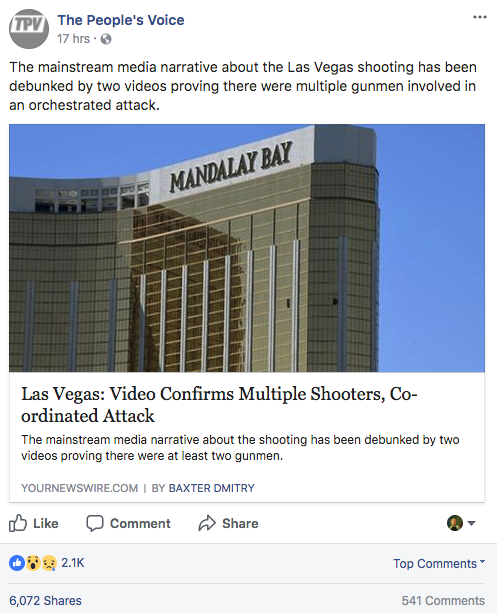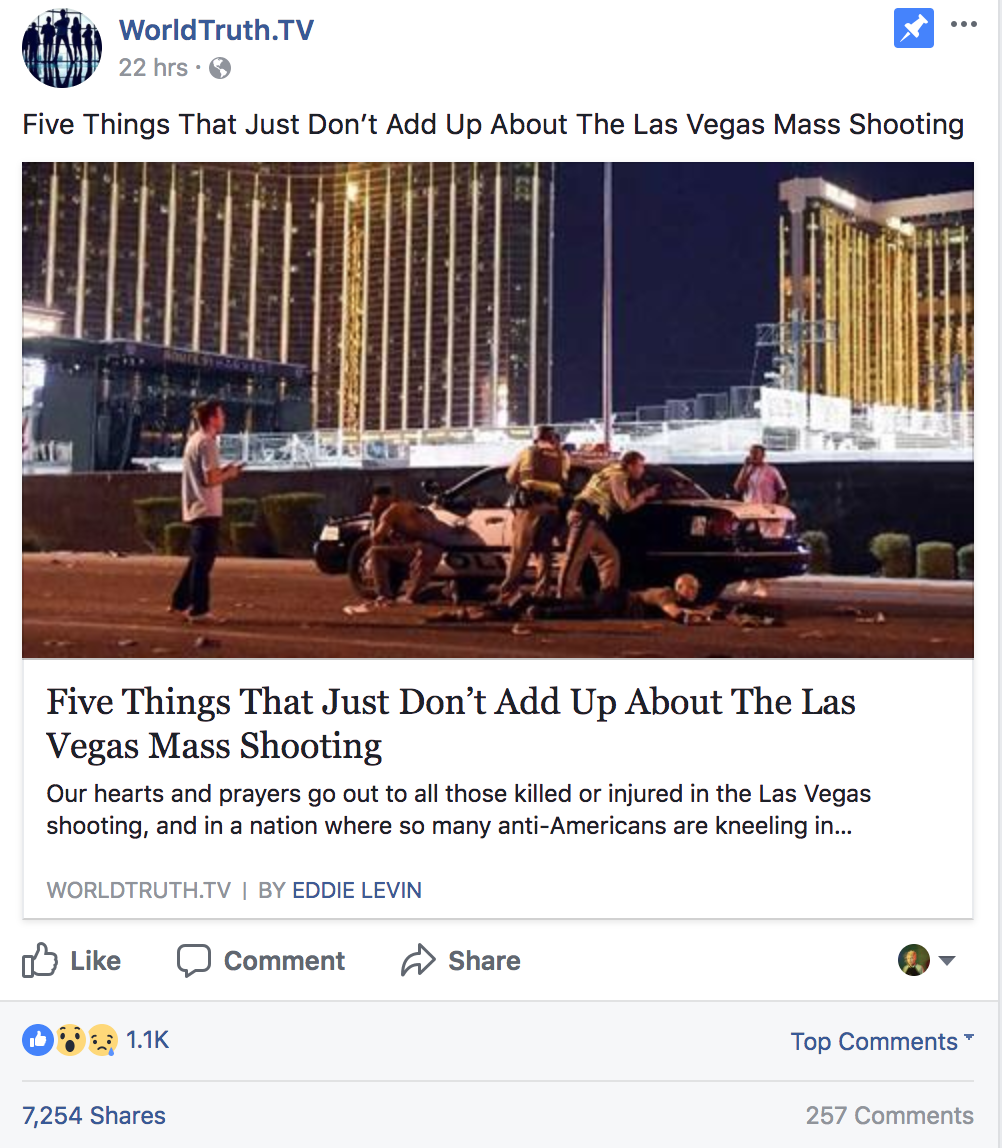If you’re one of the 1.8 million people who likes the Facebook page WorldTruthTV, you might have seen a post about “Five Things That Just Don’t Add Up About The Las Vegas Mass Shooting,” which cites debunked reports of blocked exits and that the shooter possessed weapons “almost impossible” to obtain.And if you’re among the 453,000 people who like the page 4biddenknowledge or the 723,000 who subscribe to The People’s Voice page, you have probably seen some conspiracy theories about links to antifa or multiple shooters flying around about the Sunday night attack.Viral fake news stories on about the Las Vegas shooting like these — shared by largely right-leaning pages with huge audiences — appear to be vastly outperforming other posts that these pages share, based on a sample collected by VICE News, a sign that digital platforms like Facebook, Google, YouTube, and Twitter are still enabling an economy of misinformation and propaganda masquerading as news.“Yes, I noticed a small bump in Facebook traffic,” said Billy Carson, the blogger who operates 4biddenknowledge, about publishing Vegas-related conspiracy headlines. “These posts about the Vegas mass shooting definitely have people talking and talking is good.” Silicon Valley platforms have all failed to manage the deluge of fake news and conspiracy theories that emerged on their networks in the wake of the Vegas shooting. Google and YouTube were surfacing false reports about Paddock in searches for information, and in one case, Google even promoted links to 4chan message boards conspiring about the topic.The WorldTruthTV post, according to Facebook’s analytics tool CrowdTangle, is reaching audiences better than other content on that page by a multiple of around 250. For 4biddenknowledge, their Vegas fake news is doing 150 times better than normal, and The People’s Voice post about “multiple gunmen” at the attack is at around 512 times that page’s average reach. These measurements were taken mid-Tuesday afternoon on CrowdTangle, roughly 40 hours after the mass shooting in Las Vegas began.A comparable sample of mainstream news stories about the mass shooting, however, show that their Las Vegas stories don’t outperform other Facebook content in the same way that it does for viral fake news pages. Among a sample of posts from Fox News, the Washington Post, CNN, and the New York Times, a Post video of footage from the scene of the shooting outperformed the post, by 3.8 times the newspaper’s average Facebook post reach.Mainstream media outlets did have stories and videos that over performed in social media, just not straight news. Most major outlets aggregated Jimmy Kimmel’s emotional monologue about the massacre; Kimmel’s speech brought in bigger engagement numbers for the Post and Times than any other Vegas stories.
Silicon Valley platforms have all failed to manage the deluge of fake news and conspiracy theories that emerged on their networks in the wake of the Vegas shooting. Google and YouTube were surfacing false reports about Paddock in searches for information, and in one case, Google even promoted links to 4chan message boards conspiring about the topic.The WorldTruthTV post, according to Facebook’s analytics tool CrowdTangle, is reaching audiences better than other content on that page by a multiple of around 250. For 4biddenknowledge, their Vegas fake news is doing 150 times better than normal, and The People’s Voice post about “multiple gunmen” at the attack is at around 512 times that page’s average reach. These measurements were taken mid-Tuesday afternoon on CrowdTangle, roughly 40 hours after the mass shooting in Las Vegas began.A comparable sample of mainstream news stories about the mass shooting, however, show that their Las Vegas stories don’t outperform other Facebook content in the same way that it does for viral fake news pages. Among a sample of posts from Fox News, the Washington Post, CNN, and the New York Times, a Post video of footage from the scene of the shooting outperformed the post, by 3.8 times the newspaper’s average Facebook post reach.Mainstream media outlets did have stories and videos that over performed in social media, just not straight news. Most major outlets aggregated Jimmy Kimmel’s emotional monologue about the massacre; Kimmel’s speech brought in bigger engagement numbers for the Post and Times than any other Vegas stories. Though Stephen Paddock was publicly identified within a few hours of the attack as the culprit who killed 59 people and injured more than 500, seedier corners of the internet such as 4chan quickly moved to shift blame toward Paddock’s imagined leftist political sympathies. Law enforcement officials, meanwhile, have not yet disclosed a possible motive for Paddock’s attack.A now-deleted Facebook post by “Melbourne Antifa” that praised the attack — the page has been derided by documented antifa groups and journalists as a right-wing plant account — is being used as evidence for Paddock’s wholly invented leftist sympathies. On such flimsy evidence, far-right and fake news sources went wild with false claims about the 64-year-old real estate investor and high-stakes gambler’s antifa ties.Silicon Valley leaders, such as Facebook CEO Mark Zuckerberg, have begun to reckon with the havoc that their algorithms have wrought, in response to crises like post-terror attack social media hoaxes and 2016 election-related fake news.“After the election, I made a comment that I thought the idea misinformation on Facebook changed the outcome of the election was a crazy idea,” Zuckerberg said in a recent Facebook post. “Calling that crazy was dismissive and I regret it.”But he defended broader role in the political discourse: “But the data we have has always shown that our broader impact — from giving people a voice to enabling candidates to communicate directly to helping millions of people vote — played a far bigger role in this election.” Facebook representatives did not immediately respond to a request for comment.
Though Stephen Paddock was publicly identified within a few hours of the attack as the culprit who killed 59 people and injured more than 500, seedier corners of the internet such as 4chan quickly moved to shift blame toward Paddock’s imagined leftist political sympathies. Law enforcement officials, meanwhile, have not yet disclosed a possible motive for Paddock’s attack.A now-deleted Facebook post by “Melbourne Antifa” that praised the attack — the page has been derided by documented antifa groups and journalists as a right-wing plant account — is being used as evidence for Paddock’s wholly invented leftist sympathies. On such flimsy evidence, far-right and fake news sources went wild with false claims about the 64-year-old real estate investor and high-stakes gambler’s antifa ties.Silicon Valley leaders, such as Facebook CEO Mark Zuckerberg, have begun to reckon with the havoc that their algorithms have wrought, in response to crises like post-terror attack social media hoaxes and 2016 election-related fake news.“After the election, I made a comment that I thought the idea misinformation on Facebook changed the outcome of the election was a crazy idea,” Zuckerberg said in a recent Facebook post. “Calling that crazy was dismissive and I regret it.”But he defended broader role in the political discourse: “But the data we have has always shown that our broader impact — from giving people a voice to enabling candidates to communicate directly to helping millions of people vote — played a far bigger role in this election.” Facebook representatives did not immediately respond to a request for comment.
Advertisement

Advertisement
